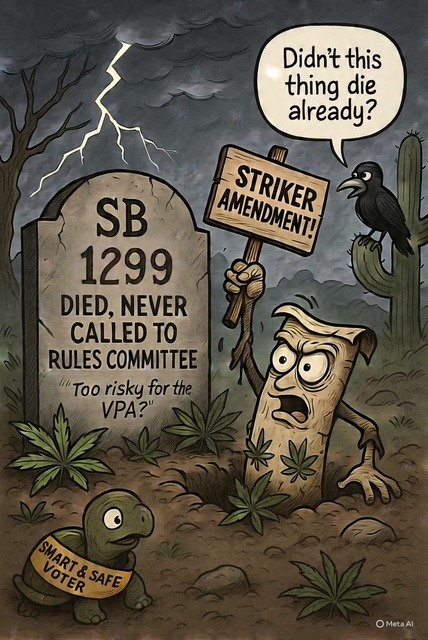A controversial cannabis enforcement bill that had seemingly stalled in committee has come roaring back to life. Senate Bill 1299, a late-session “striker” bill, was revived this week and pushed through multiple hurdles on Wednesday, June 18. After months of dormancy and no hearing in the House Rules Committee, the bill was suddenly fast-tracked—clearing House Rules, House Caucus, and the Committee of the Whole in a single day.
Industry-Backed Push to Combat Illicit Cannabis Market
SB 1299 proposes to divert money from the voter-approved Smart and Safe Arizona Fund to create a new law enforcement fund under the Arizona Department of Public Safety (DPS). Critics argue this move strips money from a fund that was designed to support public health, education, and infrastructure, and instead reroutes it toward policing the illegal cannabis market—including legal hemp and legacy sellers. (Yes, it takes money from the licensed market to go after your local plug)
Supporters of S.B. 1299 argue the funding is necessary to crack down on Arizona’s growing illicit cannabis market. But behind the push is a deeper story: the licensed cannabis industry itself didn’t just endorse the bill—they requested it. Representative Matt Gress introduced the measure at the urging of legal market operators who are watching their profits shrink.
Legal Concerns Raised Over Potential Voter Protection Act Conflict
When the bill came before the House Rules Committee on June 18, a legislative attorney raised red flags about its potential conflict with the Voter Protection Act (VPA)The Voter Protection Act (VPA) is an Arizona constitutional safeguard that prevents lawmakers from changing or diverting funds from voter-approved initiatives unless the changes further the original intent and pass with a three-fourths majority vote.
“Chairman, the striker to SB 1299 establishes the Safe Enforcement Fund under the administration of DPS to enforce the recreational marijuana laws. Because this was a voter backed law, we apply a VPA analysis which requires legislation to further the purpose of the underlying act.”
“Here we can certainly see an argument that the voters intended to legalize recreational marijuana and want to be subject to regulations and therefore the enforcement of those regulations.”
“So to the extent that this new fund allows enforcement of these regulations, it arguably furthers the acts purpose.”
“However, we can also see an argument that the bill’s transfer of $2.5 million from the Smart and Safe Fund to the DPS administered fund does not further the acts purpose because it would affect the amounts of monies available to distribute to various entities that are statutorily entitled to those distributions.”
“In other words, because the voters outlined a specific distribution scheme for the funds in the Smart and Safe Act that does NOT include DPS, requiring the transfer… Now, of course, as with most of the VPA flags that we raise, all of that depends on facts that would need to be developed in a court and not here.”
“So while we wanted to show you our flag without further facts, we cannot say that this on its face does not further the Smart and Safe Act.”
The attorney acknowledged one line of reasoning in favor of the bill. Since Arizona voters chose to legalize marijuana with regulations, it could be argued that funding enforcement aligns with their intent.But the analysis quickly turned to the potential problems. The Smart and Safe Act clearly spelled out how tax revenues should be distributed—and the Department of Public Safety was not one of the designated recipients.Despite concerns raised by legislative attorneys, the Rules Committee voted to advance the measure along party lines. All five Republicans present voted in favor, while the two Democrats present voted against it. The final tally was 5-2, with no members abstaining and one member absent.
SB 1299 Clears Caucus Meetings with Little Discussion, RTS Question the Only Concern
SB 1299’s journey is not over yet. On its way through the process, it was presented to both the House Majority and Minority Caucuses—but received little discussion.
The only question raised came from a Democrat Representative who asked about the RTS (Request to Speak) system, wondering whether the public opinions shown were current or leftover from the previous version of the bill before the striker amendment. Staff assured that the information in the paperwork reflected the updated version.
Aside from that brief exchange, no lawmakers offered opinions or comments on the measure—not even in the House Majority Caucus.
For context, the RTS system is an online tool in Arizona that allows the public to submit opinions on bills, which legislators often review to gauge support or opposition before hearings or votes.
S.B. 1299 Amended in Committee of the Whole to Soften Voter Protection Concerns
Next up for S.B. 1299 was the Committee of the Whole (COW), where lawmakers approved a floor amendment aimed at making the bill more palatable and reducing potential conflicts with the Voter Protection Act (VPA).
The amendment, introduced by Representative Gress, allows the Department of Public Safety to use up to 10% of the Safe Community Enforcement Fund specifically for enforcing the Smart and Safe Arizona Act. Additionally, it directs the State Treasurer to allocate up to 5% of the $2.5 million transferred into the fund to cover DPS’s administrative costs.
S.B. 1299 is already scheduled for House Third Read on Thursday, signaling that the measure is quickly moving toward a final vote.
Tune into our update to find out how it went.


